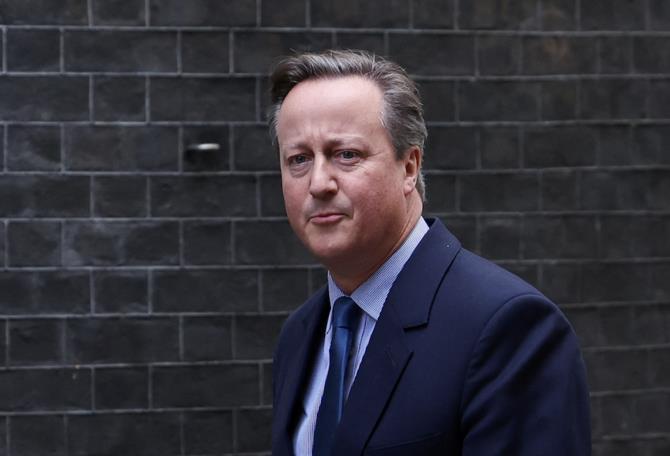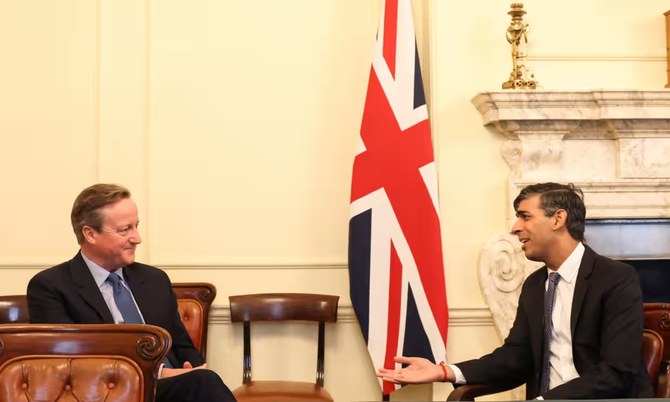
David Cameron, the former UK prime minister, has repeatedly, and conveniently, stated that “Britain is back” since he returned to government when he was appointed foreign secretary in November. However, his attempts to rewrite the history of the troubled political legacy he left the UK to deal with in 2016 when he resigned as premier is unlikely to succeed.
Six years after leading the Conservatives back to power in 2010, Cameron stepped down as prime minister after his huge political gamble on a referendum about Britain’s membership of the EU backfired. Now, he is energetically seeking to rewrite his political legacy after being given a position in the Cabinet by Prime Minister Rishi Sunak.
Cameron’s appointment as foreign secretary was surprising for several reasons. Firstly, he is only the second former prime minister since the Second World War to later assume another Cabinet post (and only the fifth since 1900). And following his ennoblement as Lord Cameron shortly after his appointment in November, he is only the third Cabinet minister in recent decades to serve from the House of Lords.
Secondly, his foreign policy record while prime minister, including his proclamation of a “golden era” of UK-China relations, jars with the significant shift in Western sentiment toward Beijing in recent years. Sunak even referred to Cameron’s approach as being “naive” and said the UK’s approach needs to evolve as China is “consciously competing for global influence using all the levers of state power.”
If anything, Sunak’s view of Cameron’s “golden era” policy on China is mild compared with the thoughts of some other Conservative MPs. Former party leader Iain Duncan Smith, for instance, said of Cameron’s return to the Cabinet: “I am astonished at his appointment. It seems to send a signal to China that we are pursuing business with them at all costs and any costs. Those who have been sanctioned (by Beijing) now feel more abandoned than at any time. Those facing genocide and persecution will feel more abandoned than at any time.”
This is the context in which Cameron took office six months ago, seeking to rewrite his own political legacy. On the positive side of the ledger, even some of his critics acknowledge that he has brought a renewed energy to the role of foreign minister compared with his immediate Conservative predecessors in the role.
During his first 100 days in office he made 36 official visits to 26 countries, including Ukraine, Israel, the West Bank, several European capitals, the Falkland Islands, Paraguay, Brazil and the US, including a stop in New York City to attend the UN.
Moreover, the fact he is a former prime minister has also possibly made it easier for him to arrange some meetings than it would have been for his Conservative predecessors as foreign minister, such as James Cleverly. Take, for example, Cameron’s recent meeting with Donald Trump in Florida; the former president might not have been so quick to grant an audience to a UK foreign secretary who had not previously ruled the country.
Some of his critics acknowledge that he has brought a renewed energy to the role of foreign minister compared with his immediate Conservative predecessors in the role.
Andrew Hammond
It is also clear that Cameron genuinely enjoys being foreign secretary. As the UK’s former national security adviser, Peter Ricketts, observed: “Frankly, I don’t think Sunak is very interested in international affairs and I think he’s happy to leave that to Cameron, who always found foreign affairs fascinating as prime minister and now he can do it full time.”
Nevertheless, Cameron is unlikely to fundamentally change his political legacy. One of the most famous quotes in UK politics was by controversial former Cabinet minister, Enoch Powell, who said: “All political lives, unless they are cut off in midstream at a happy juncture, end in failure, because that is the nature of politics and of human affairs.”
While that is much too sweeping a statement to be factually accurate, it nonetheless captures the predicament of several recent UK prime ministers, including Cameron. Liz Truss, for example, survived fewer than 49 days in office, the shortest-ever tenure in 10 Downing Street. Her predecessor, Boris Johnson, ultimately limped from office after a series of damning scandals.
So while Cameron has brought more energy to the Foreign Office, he has done little to stabilize the wider sense of strategic drift in UK foreign policy in recent years. Moreover, he appears to still disagree with Sunak on potentially key issues, including the government’s plan to send asylum seekers who enter the UK illegally to Rwanda.
Sunak has repeatedly threatened to withdraw the UK from the European Convention on Human Rights if judges at the European Court of Human Rights try to thwart his Rwanda policy.
However, Cameron has said: “I don’t think it’s necessary to leave the (convention), I don’t think that needs to happen to make this policy work.” He is acutely aware that only two nations have ever left the human rights convention, Russia and Belarus, and it is not a club he wants the UK to join.
Indeed, Cameron has explicitly stated he favors a return to the pre-Brexit position of a migrant-returns agreement with France, to help break up smuggling gangs and stop people making the perilous journey across the Channel in small boats. Under such a deal, he said, “people land on a beach in Kent, you take them straight back to France, you therefore break the model of the people smugglers. Now, I’d love that situation to be the case again, that’s the most sensible thing.”
However, he concedes that this is “simply not possible” because “the situation we’re in” since leaving the EU means it is not practical.
Taking all of this together, it is therefore unlikely that Cameron will be able to completely shake off the troubled political inheritance he left the UK with in 2016 when he resigned as prime minister in the aftermath of the Brexit vote.
While his more energetic approach to foreign affairs compared with recent Conservative predecessors is welcome, there remains a deeper, wider sense of strategic drift in UK foreign policy.
Andrew Hammond is an associate at LSE IDEAS at the London School of Economics.












